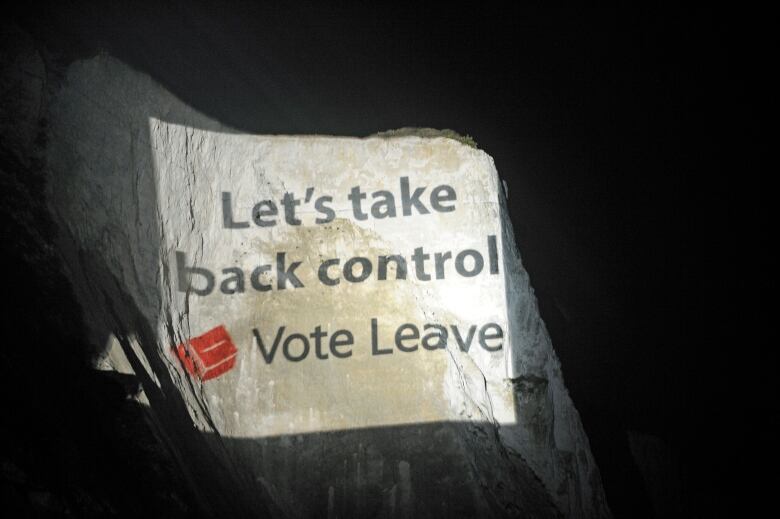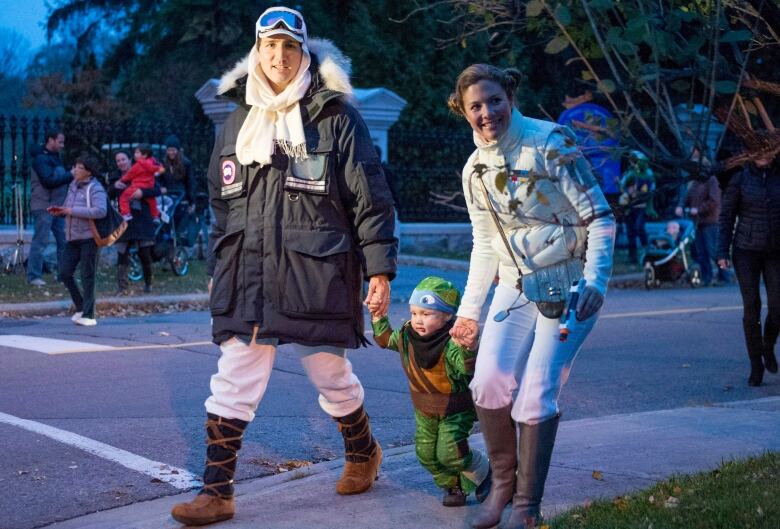New questions about Canadian influence on Brexit vote
A deeper dive into the day's most notable stories

Welcome to The National Today, which takes a closer look at what's happening around some of the day's most notable stories. Sign up here under "Subscribe to The National's newsletter," and it will be delivered directly to your inbox Monday to Friday.
Data-miners for hire
Data-mining and micro-targeted ads were a big part of the "Leave" campaign's Brexit success, as well as Donald Trump's 2016 presidential victory.
Now questions are being raised about the hired-gun companies who put politics on your Facebook feed.
The Globe and Mail reports that Privacy watchdogs in the U.K. and British Columbia have launched investigations into how a small Canadian firm — AggregateIQ — used the personal information of voters to help sway their choices in the 2016 EU referendum.

Last February, the Daily Telegraph calculated that Aggregate had been paid almost $6 million by the Vote Leave campaign, more than 40 per cent of its budget, and 10 per cent of the total spent by all groups in the referendum battle.
No other company or individual received more funds, according to the U.K. Electoral Commission.
AggregateIQ was said to have been "instrumental" in motivating Leave voters via targeted online ads and interactions.
In November, the rival Guardian published another report questioning whether Vote Leave had actually breached its official 7 million pound spending limit during the campaign. The paper claims to have seen Electoral Commission documents alleging that the group donated more than $1 million CDN to a young London fashion student, but that much of the money ended up in AggregateIQ's bank account.
No specific allegations of wrongdoing have been made against AggregateIQ. And in a blog posting this week, Elizabeth Denham, the U.K. Information Commissioner, wrote that her interest has been piqued by larger worries about election campaign trends.

Apparently, she is not alone.
The Wall St. Journal is reporting that special counsel Robert Mueller is probing the connections between another data-mining firm — Cambridge Analytica — and Donald Trump.
He has asked that the firm hand over emails from all employees who worked on the 2016 U.S. campaign for the Republicans.
The U.S.-based company was founded by Robert Mercer, a well-known supporter of right-wing causes and co-owner of Breitbart News. The data company also provided help to another pro-Brexit group — Leave.EU — during the referendum campaign.
The advice and support came at no cost, however, as Mercer is a close friend of prominent-Leaver Nigel Farage.
There have been calls for the U.K. Electoral Commission to launch an investigation into the arrangement, but it says its powers do not extend beyond British shores.
'Do ask, do tell'
A government inquiry into sexual abuse against children in Australia has handed down sweeping recommendations on how to transform the country into a "do ask, do tell" culture, including mandatory reporting laws, as well as an end to the sanctity of the confession and celibacy requirements of the church.
The 17-volume final report from The Royal Commission into Institutional Responses to Child Abuse was tabled today, after five years of work. The commission heard from more than 16,000 victims during 57 public hearings and 8,000 private sessions.

"In past generations, the trust placed by some parents and the broader community in institutions and their members meant that abusers were enabled and children's interests were compromised," says the report.
It describes a "prevailing culture that 'children should be seen and not heard.'"
Many of the commission's findings focus on priests and ministers, and more specifically the Catholic Church. It accounted for 60 per cent of the allegations of abuse in church-run institutions, and is accused of demonstrating a "catastrophic failure of leadership" in the past.

-
All religious groups be legally required to report allegations or suspicions of abuse to authorities, even if they come via the confessional.
-
Candidates for religious ministry undergo "external" psychological testing, including a psycho-sexual assessment to determine if they are fit to work with children.
-
A national child abuse prevention strategy be instituted.
-
The Australian Catholic Church ask Rome for permission to make celibacy voluntary for priests.
That final demand, at least, might receive a sympathetic hearing in some parts of the Vatican.
Last month, Pope Francis reportedly asked for an official debate of a request by Brazilian bishops that priests in the Amazon region be allowed to marry. The country is experiencing the same challenges in recruiting and retaining priests as many Catholic nations.
In France, for example, the average age of priests is above 60. In the United States, it has gone from 35 in 1970, to 63 in 2009.
he most acute problem might be in Ireland, however, where just five trainees entered the Maynooth seminary this fall, a 222-year low. Once the world's largest supplier of priests, Maynooth was built to accommodate 500 students.
Star Wars
You probably haven't heard anything about it, but there's a new Star Wars film called The Last Jedi...
The film opened last night with "special sneak previews" on 1,300 screens around the world, which sort of stretches the concept.

Predictions are that its worldwide opening weekend box office take will be in the $424 million to $440 million US range, probably exceeding its cost. (The Last Jedi's budget has remained a secret, but the previous Star Wars episode, The Force Awakens, cost $306 million.)
The hype isn't even bound by gravity. NASA plans to beam a digital copy up to the International Space Station soon so that the crew can stay up to date.

It remains the most successful Star Wars film. The Force Awakens stands second, having grossed $2.058 billion worldwide.
All told, the 10 films — including last year's Rogue One, and 2008's Clone Wars — have earned more than $7.6 billion at the box office.

George Lucas, who created the saga, was paid just $150,000 to write and direct the first film. But he cleverly made what might have been the best deal in Hollywood history, retaining the merchandising and sequel rights. Today, his net worth is estimated at $5.5 billion.
But the most astounding Star Wars numbers remain these: Darth Vader stands 6-foot-8-inches, while Anakin Skywalker's height is 6-foot-1...
Justin Trudeau has already seen the new film, treating patients from the Children's Hospital of Eastern Ontario — and two of his own kids, Xavier and Ella-Grace — to a surprise screening in Ottawa on Tuesday.
Of course, it's not the first time the Prime Minister has gotten the jump on other Star Wars fans. Here he is nerding out at an advance screening of Return of the Jedi as an 11-year-old in 1983:
And here he is nerding out on Halloween in 2015, at the age of 42:

Quote of the moment
"It is factually, so far as we have been able to establish, without legal precedent in criminal law."
- Tony Badenoch, a Crown prosecutor in Birmingham, U.K., after Dr. Simon Bramhall entered a guilty plea yesterday. The transplant surgeon has admitted to using an argon beam to etch his initials onto the newly installed livers of two of his patients.
What The National is reading
- Quebec TV network backs away from debunked mosque report. (CBC)
- Nigeria will spend $1 billion in oil surplus money on the fight against Boko Haram. (Bloomberg)
- Russia a 'risk' to undersea cables, warns U.K. defence chief. (BBC)
- Happy Valley-Goose Bay mayor dies from shotgun wound. (CBC)
- Crime-fighting robot retired after launching alleged 'war on the homeless.' (Washington Post)
- The boundary-pushing, satirical Saudi cartoon that millions are watching. (CNN)
- A really, really, really detailed story about Wham!'s 'Last Christmas.' Fair warning. (Guardian)
Today in history
Dec. 15, 1986: Gross toys for Christmas
Department stores can't keep 'Slime' and 'Madballs' on the shelves. Because "research shows that little boys don't want to play with cute little toys."



